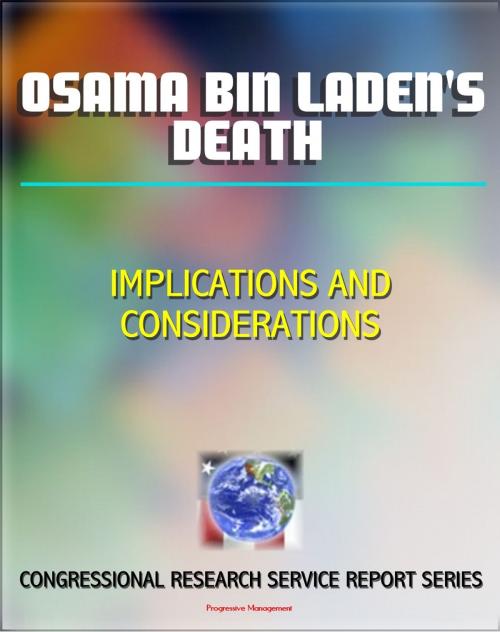Osama bin Laden’s Death: Implications and Considerations - Congressional Research Service Report
Nonfiction, Social & Cultural Studies, Political Science| Author: | Progressive Management | ISBN: | 9781458037107 |
| Publisher: | Progressive Management | Publication: | May 21, 2011 |
| Imprint: | Smashwords Edition | Language: | English |
| Author: | Progressive Management |
| ISBN: | 9781458037107 |
| Publisher: | Progressive Management |
| Publication: | May 21, 2011 |
| Imprint: | Smashwords Edition |
| Language: | English |
This important CRS report discusses the implications of the death of Osama bin Laden and its effect on the future of al Qaeda. Contents * Implications of the Death of Osama bin Laden * Congressional Notification * Possible Questions * Legal Considerations * Military Considerations * Command and Control of the Operation * Possible Questions * Al Qaeda, Regional, and Country Implications * Implications for AQ, Affiliates, and Unaffiliated Adherents * Implications of OBL’s Death on AQ’s Global Affiliates * Pakistan * Implications for the U.S.-Pakistan “Strategic Partnership” * Possible Implications for Pakistan-India Relations * Possible Implications for Pakistan-Afghanistan Relations * Issues in Pakistan’s Domestic Setting * Afghanistan * Possible Questions * U.S. Strategy and Security Implications * National Security Considerations * Background * Possible Questions * Possible Implications for the Homeland * Homegrown Jihadists * Possible Questions * FBI Investigations * Possible Implications for U.S. Security Interests * Near Term Implications for U.S. Security Interests * Long Term Implications for U.S. Security Interests * Implications for U.S. Foreign Policy in the Middle East * Issues and questions related to the killing of Osama bin Laden (OBL) are multifaceted and may have operational, regional, and policy implications. Operational policy issues include congressional notification, legal considerations, and current and future military activities.
The May 1, 2011 killing of Osama bin Laden (OBL) by U.S. forces in Pakistan has led to a range of views about near-and long-term security and foreign policy implications for the United States. Experts have a range of views about the killing of OBL. Some consider his death to be a largely symbolic event, while others believe it marks a significant achievement in U.S. counterterrorism efforts. Individuals suggesting that his death lacks great significance argue that U.S. and allied actions had eroded OBL’s ability to provide direction and support to Al Qaeda (AQ). For these analysts, OBL’s influence declined following the U.S. invasion of Afghanistan to a point where prior to his death he was the figurehead of an ideological movement. This argument reasons that a shift of terrorist capability has occurred away from the core of AQ to affiliated organizations. Still others argue that OBL pursued a strategy of developing the AQ organization into an ideological movement thus making it more difficult to defeat. They contend that, even if OBL were no longer involved in the decision-making apparatus of AQ, his role as the inspirational leader of the organization was far more important than any operational advice he might offer. As such, his death may not negatively affect the actions of the ideological adherents of AQ and as a martyr he may attract and inspire a greater number of followers.
The Congressional Research Service (CRS) works exclusively for the United States Congress, providing policy and legal analysis to committees and Members of both the House and Senate, regardless of party affiliation. As a legislative branch agency within the Library of Congress, CRS has been a valued and respected resource on Capitol Hill for nearly a century. CRS is well-known for analysis that is authoritative, confidential, objective and nonpartisan. Its highest priority is to ensure that Congress has 24/7 access to the nation’s best thinking.
This important CRS report discusses the implications of the death of Osama bin Laden and its effect on the future of al Qaeda. Contents * Implications of the Death of Osama bin Laden * Congressional Notification * Possible Questions * Legal Considerations * Military Considerations * Command and Control of the Operation * Possible Questions * Al Qaeda, Regional, and Country Implications * Implications for AQ, Affiliates, and Unaffiliated Adherents * Implications of OBL’s Death on AQ’s Global Affiliates * Pakistan * Implications for the U.S.-Pakistan “Strategic Partnership” * Possible Implications for Pakistan-India Relations * Possible Implications for Pakistan-Afghanistan Relations * Issues in Pakistan’s Domestic Setting * Afghanistan * Possible Questions * U.S. Strategy and Security Implications * National Security Considerations * Background * Possible Questions * Possible Implications for the Homeland * Homegrown Jihadists * Possible Questions * FBI Investigations * Possible Implications for U.S. Security Interests * Near Term Implications for U.S. Security Interests * Long Term Implications for U.S. Security Interests * Implications for U.S. Foreign Policy in the Middle East * Issues and questions related to the killing of Osama bin Laden (OBL) are multifaceted and may have operational, regional, and policy implications. Operational policy issues include congressional notification, legal considerations, and current and future military activities.
The May 1, 2011 killing of Osama bin Laden (OBL) by U.S. forces in Pakistan has led to a range of views about near-and long-term security and foreign policy implications for the United States. Experts have a range of views about the killing of OBL. Some consider his death to be a largely symbolic event, while others believe it marks a significant achievement in U.S. counterterrorism efforts. Individuals suggesting that his death lacks great significance argue that U.S. and allied actions had eroded OBL’s ability to provide direction and support to Al Qaeda (AQ). For these analysts, OBL’s influence declined following the U.S. invasion of Afghanistan to a point where prior to his death he was the figurehead of an ideological movement. This argument reasons that a shift of terrorist capability has occurred away from the core of AQ to affiliated organizations. Still others argue that OBL pursued a strategy of developing the AQ organization into an ideological movement thus making it more difficult to defeat. They contend that, even if OBL were no longer involved in the decision-making apparatus of AQ, his role as the inspirational leader of the organization was far more important than any operational advice he might offer. As such, his death may not negatively affect the actions of the ideological adherents of AQ and as a martyr he may attract and inspire a greater number of followers.
The Congressional Research Service (CRS) works exclusively for the United States Congress, providing policy and legal analysis to committees and Members of both the House and Senate, regardless of party affiliation. As a legislative branch agency within the Library of Congress, CRS has been a valued and respected resource on Capitol Hill for nearly a century. CRS is well-known for analysis that is authoritative, confidential, objective and nonpartisan. Its highest priority is to ensure that Congress has 24/7 access to the nation’s best thinking.















